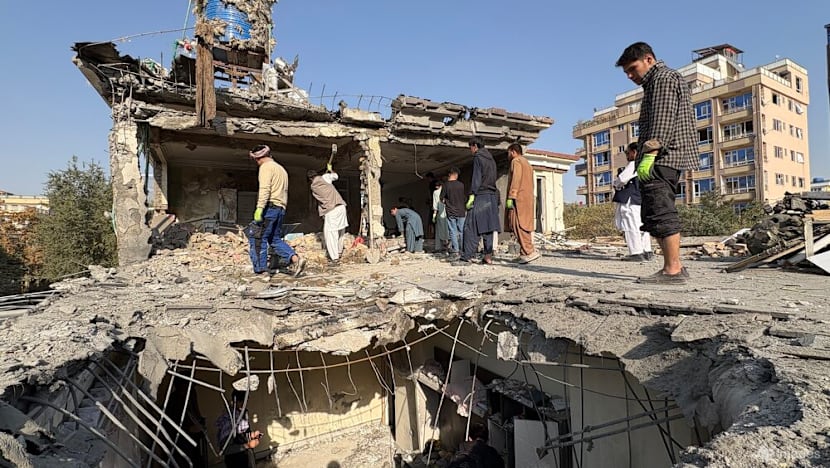Commentary: Pakistan is paying a high price for its Taliban strategy
A few days after the Taliban rolled into the Afghan capital in 2021, the head of Pakistan’s powerful intelligence service told the media: “Don’t worry, everything will be okay.” Four years on, everything is not okay, says Bloomberg Opinion's Mihir Sharma.

Residents remove debris from a house damaged by two drone strikes, in Kabul, Afghanistan, on Oct 16, 2025. (AP Photo/Siddiqullah Alizai)

This audio is generated by an AI tool.
NEW DELHI: A few days after the Taliban rolled into the Afghan capital in 2021, the head of Pakistan’s powerful intelligence service - sipping tea in a Kabul hotel - told the media: “Don’t worry, everything will be okay.”
Four years on, everything is not okay. Dozens of soldiers from both sides have been killed along the two countries’ disputed border, and emissaries are in Istanbul testily hammering out an agreement to step back from further confrontation.
The outbreak of violence came after the Pakistani air force struck targets in Kabul, apparently in an attempt to assassinate the leader of the Tehreek-i-Taliban Pakistan (TTP), which has long been the nation’s most serious internal threat. In September, the TTP killed 12 soldiers in the tribal Pashtun belt, prompting defence minister Khwaja Asif to declare that “enough is enough.”
This exasperated reaction does sound a little odd to Indian ears: After all, New Delhi was also infuriated by a terrorist attack in Kashmir earlier this year, and felt justified in sending airstrikes against militant training cells in Pakistan. Clearly Islamabad has a very different attitude to its western and eastern borders.
A DIFFICULT POSITION
Pakistan’s leaders are in a difficult position. Like India, they are constantly subject to a slow drip of terrorist activity financed and supported from across a porous border; like the Taliban, they feel unable to go after domestic militants who are ideological comrades and militarily helpful.
The TTP has long been a thorn in Islamabad’s side, and it should not have been difficult to predict that the capture of Kabul by their fellow travellers, the Afghan Taliban, would allow them to step up their attacks on the Pakistani security establishment.
The absence of the United States has also changed things: Three previous leaders of the organisation have been killed by US drones, but the generals had to send in their own air force this time. It is uncertain if President Donald Trump’s offer to get this confrontation “solved very quickly” is sufficient compensation for the absence of US military support.
For the generals, the problem is intensified by the fact that they are feuding with the political leadership of the Pashtun-dominated border state of Khyber-Pakhtunkhwa. The province’s chief minister, who remains loyal to jailed former prime minister Imran Khan, has warned against fresh military operations in the area. The absence of a political outlet for locals’ frustrations will only strengthen the TTP. Islamabad’s adversarial approach to Afghan refugees - it is acting on a long-standing threat to deport millions of migrants, many of whom have been in the country for decades - has not helped either.
Meanwhile, the Afghan Taliban have grown more confident as the international community slowly accepts their position as representatives of the state. It was probably no coincidence that Pakistan chose to bomb Kabul while the Taliban foreign minister was in India for a week, meeting his counterpart S Jaishankar and being mobbed by students at the seminary where his particular stream of Islamic revivalism was born.
DANGERS AT HOME
In their joy at seeing the US defeated, Pakistan’s military failed to foresee the natural consequences of a Taliban victory: a resurgent TTP, a restive border population, and a renewed fear of encirclement. It is no surprise that ministers are threatening “open war” unless the current peace talks in Turkey come up with a proper framework for cooperation and de-escalation.
The Taliban may want that as much as the Pakistanis do. Certainly, a ceasefire hammered out in Qatar after more than a week of clashes has held so far. But they have their own empire-building local leaders to appease and control, and as far as they are concerned, it is safer to have militants in the TTP than in the local branch of Islamic State, their chief rival for power. After all, the TTP at least symbolically pledges allegiance to the Taliban’s own emir.
Hopefully the talks will prevent the border clashes from spreading. But for any sustainable solution, Islamabad will indeed need open war - and fighting in Afghanistan has hardly worked out well for anyone who has tried it - or give Afghanistan the same respectful treatment it hopes for itself. With or without Imran Khan, it will have to restore Pashtuns’ belief that they have a voice in the federal government’s decisions, while also building consensus for painful, ground-level military action against a rejuvenated TTP.
And it should finally recognise that extremism burns whoever touches it.
The generals spent years investing in the “Haqqani network” of militants that they hoped would serve as a bridge with the Afghan Taliban. Instead, the vast spider web of Islamist preachers and seminaries they tolerate serves to limit the action the state can take against those who threaten it. Pakistan’s leaders are battling a foreign enemy because they fear fighting the dangers they incubate at home.













